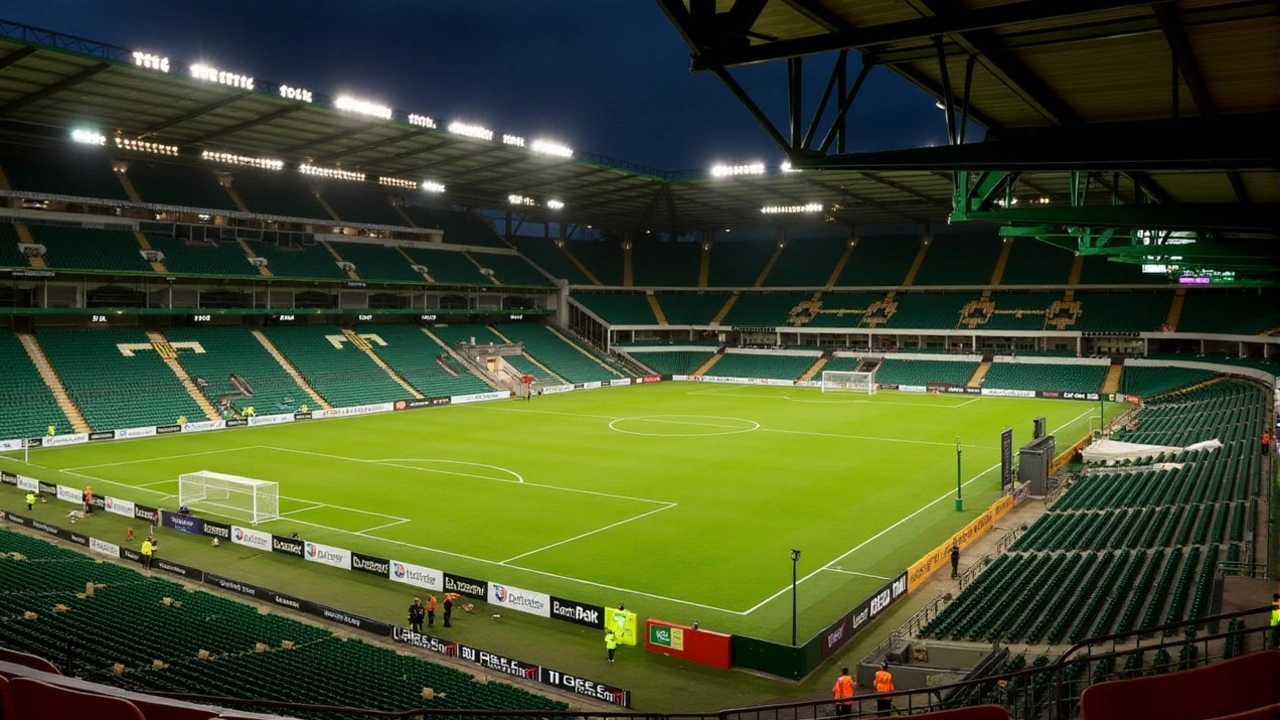
Celtic vs Dundee Match: Safety Takes Precedence Over Storm Eowyn's Havoc
In what was poised to be one of the thrilling fixtures of the Scottish Premiership, fans were gearing up to witness Celtic's clash against Dundee on a typical bustling Saturday. However, the weather had other plans. In a swift and unexpected twist, Storm Eowyn made her ominous presence felt across central Scotland, turning the festive atmosphere somber with blustering winds peaking at around 160 kilometers per hour (100 mph). This powerful tempest prompted the Met Office to issue a formidable red weather warning, signaling an evident danger to life.
The damage inflicted upon Celtic Park by these fierce winds proved significantly more substantial than what the club could contend with in such a short time frame. As Saturday morning dawned and assessments were conducted, it became clear to club officials that the safety of everyone—players, staff, and fans alike—would be at risk if the match went ahead as scheduled. Prioritizing security over the sport, Celtic announced the postponement of the highly anticipated match, much to the dismay of keen followers but ultimately in deference to their well-being. The club reassured everyone stating, "Today's scheduled Scottish Premiership match between Celtic and Dundee at Celtic Park has been called off. Unfortunately, due to the stadium damage sustained yesterday, we have been advised that we are unable to proceed with today's match. While clearly this is disappointing, the safety of our supporters will always be our priority."
Scotland's Sporting Calendar Disrupted
It wasn't just the fans at Celtic who felt the repercussions of Storm Eowyn's wrath. A ripple effect was seen across various sports arenas in Scotland, bringing the realm of sporting activities to a standstill. Over at Gayfield, the League One encounter between Arbroath and Kelty Hearts also faced cancellation due to unwelcome structural damages. Similarly, preparations for the adrenaline-pumping rugby union match between Glasgow and Connacht were discontinued, with the game postponed by at least a day, testifying to Eowyn's unyielding power. The postponement of these events is a stark reminder of nature’s unpredictable nature, urging organizations and fans to brace for unforeseen changes.
Rescheduling for a Future Showdown
With the winds now calming and safety assessments underway, an alternative date for the Celtic-Dundee match was promptly arranged. Fans will have to mark February 5, 2025, on their calendars, a date which carries the promise of a rescheduled battle under the glittering lights with a kickoff at 7:45 pm. While such disruptions bring obvious disappointment, there’s also a chance for both teams to regroup, strategize, and return stronger. Players and coaches alike will likely use this extended breather not only to reflect on tactical improvements but also to heal any niggling injuries, thus ensuring their best possible performance when the match resumes.
Nature Versus Human Planning
Natural disasters such as Storm Eowyn serve as poignant reminders of the limited control humans have over nature. Despite the best laid plans, safety must always take precedence, underscoring the importance of responsive infrastructure and emergency planning in sports events. The quick response by the clubs and governing bodies—including the Met Office’s timely alerts—highlight just how crucial effective communication and decision-making are in mitigating potential hazards. Fortunately, the damage, though significant in regards to infrastructure, did not lead to casualties, allowing sports fans to appreciate the broader picture at hand.
Looking Ahead
As the storm subsides and Scotland recovers, attention inevitably turns towards the rescheduled sporting events. The reprieve offers an opportunity for clubs involved to draw on their robust community links, engaging with fans to keep them excited and informed. Modern technology offers fans the chance to engage with traditions like matchday rituals and commentary, even when not physically present in the stadium, ensuring that the spirit of the game remains alive no matter the circumstances. Beyond the sporting events themselves, this recent bout of storm-induced disruptions beckons authorities to ponder over more sustainable infrastructure planning, rooting for designs that can endure such temperamental weather patterns.
Though the postponement may feel like a setback for many, it has also fortified the collective resolve of teams, fans, and organizers alike. With bated breath, they now anticipate not just the match, but an eventual triumph over adversity where nature aligns with human ambition once again. As rescheduled dates draw nearer, the vibrant Celtic Park will add yet another story of resilience to its hallowed grounds.





